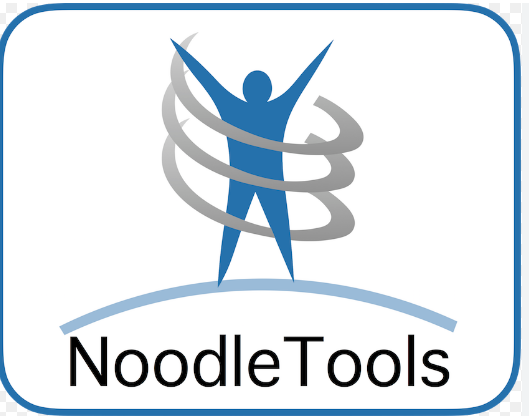NoodleTools is a web-based research management platform that helps students and researchers create, organize, and cite their sources while collaborating on projects. It supports MLA, APA, and Chicago/Turabian citation styles and offers feedback and guidance from educators and experts. NoodleTools is an award-winning online research management platform that promotes critical thinking and authentic research. Students stay organized as they evaluate information, build accurate citations, archive source material, take notes, outline topics, and prepare to write.
NoodleTools offers two free tools for creating and managing citations in MLA, APA, and Chicago-style. NoodleTools Express lets you create a single citation without logging in, while NoodleTools MLA Lite lets you create a Works Cited and access premium features. Three differentiated levels support individual students across a range of grade levels and abilities. The platform’s intuitive, visual “tabletop” helps users manipulate, tag, and pile notecards, then connect them to topics in their outline to prepare for writing.
Key Takeaways
- NoodleTools is a web-based research management platform that helps students and researchers create, organize, and cite their sources while collaborating on projects.
- NoodleTools offers two free tools for creating and managing citations in MLA, APA, and Chicago-style.
- The platform’s intuitive, visual “tabletop” helps users manipulate, tag, and pile notecards, then connect them to topics in their outline to prepare for writing.

History of Noodle Tools
Noodle Tools was founded in 1999 by Damon Abilock, a former teacher and school librarian, and his wife Debbie Abilock, a former teacher and educational technology consultant. The idea for Noodle Tools came about when Damon Abilock was frustrated with the lack of tools available to help students properly cite sources in their research papers.
Initially, Noodle Tools was a simple citation generator, but over time it has evolved into a comprehensive research management platform that helps students at all stages of the research process. Today, Noodle Tools is used by more than 50,000 schools and universities worldwide.
One of the key features of Noodle Tools is its focus on teaching students critical thinking skills, rather than just providing a tool for citation. The platform includes features such as notecards, outlining tools, and the ability to evaluate sources for reliability and bias.
Noodle Tools has won numerous awards for its innovative approach to research management, including the prestigious CODiE award for “Best Education Technology Solution” in 2018. The company continues to innovate and improve its platform to meet the evolving needs of students and educators in the digital age.
Types of Noodle Tools
Rolling Pins
Rolling pins are one of the most basic noodle tools. They are used to roll out and flatten dough to the desired thickness. They come in different sizes and materials such as wood, metal, and silicone. Rolling pins with handles are easier to use and provide better control, while those without handles are ideal for small spaces.
Pasta Machines
Pasta machines are used to roll and cut pasta dough into various shapes and sizes. They come in manual and electric models and can be made of stainless steel or plastic. Pasta machines are versatile and can be used to make different types of pasta such as spaghetti, fettuccine, and lasagna.
Noodle Cutters
Noodle cutters are used to cut pasta dough into noodles of different widths and shapes. They come in different sizes and materials such as stainless steel and plastic. Some noodle cutters are adjustable and can be used to make different types of noodles, while others are designed for specific types of noodles.
Dough Mixers
Dough mixers are used to mix and knead dough quickly and efficiently. They come in different sizes and types such as stand mixers and hand mixers. Dough mixers are ideal for making large batches of dough or when making dough by hand is not practical.
Overall, these noodle tools are essential for making homemade noodles. They provide better control and precision when making dough and cutting noodles. By using these tools, one can create a variety of noodles in different shapes and sizes.
Usage of Noodle Tools
Noodle Tools is a research management platform that helps users to organize their research, build accurate citations, archive source material, take notes, outline topics, and prepare to write. Noodle Tools creates citations according to MLA, APA, or Chicago Style standards, and it is available for both home and commercial use.
Home Use
For students and individuals who need to manage their research projects, Noodle Tools is a great tool to use. It helps users to stay organized as they evaluate information and build accurate citations. With Noodle Tools, users can archive source material, take notes, and outline topics. This makes it easier to prepare for writing and ensures that the research is conducted efficiently.
Commercial Use
Noodle Tools is also available for commercial use. It is a useful tool for businesses and organizations that need to manage their research projects. Noodle Tools can help businesses to stay organized and ensure that their research is conducted efficiently. It can also help businesses to build accurate citations and archive source material.
Overall, Noodle Tools is a powerful research management platform that can help users to stay organized and conduct their research efficiently. It is a great tool for both home and commercial use, and it is available in MLA, APA, and Chicago Style formats.
Maintenance and Care of Noodle Tools
Noodle tools are essential for making delicious and authentic noodles. However, to ensure that they work efficiently and last longer, it is crucial to maintain and care for them properly. Here are some key steps to maintain and care for your noodle tools:
Regular Cleaning
Cleaning is a fundamental aspect of noodle tool maintenance. After each use, clean the tools thoroughly with warm water and dish soap. Use a soft-bristled brush to remove any dough or flour residue that may be stuck in the crevices of the tool. Rinse the tools with clean water and dry them with a soft cloth.
Lubrication
Lubricating the noodle tools is essential to prevent rust and ensure that they operate smoothly. Apply a food-grade lubricant or oil to the moving parts of the tools. Be sure to wipe off any excess oil with a clean cloth before using the tools.
Storage
Proper storage is crucial to prevent damage to the noodle tools. Store the tools in a dry and cool place to prevent rust and corrosion. Avoid storing them in humid areas or near sources of heat. It is also essential to keep the tools away from other metal objects to prevent scratches and dents.
Inspection
Regular inspection is crucial to detect any signs of wear and tear. Check the tools for any loose or damaged parts, such as bent blades or cracks. Replace any damaged parts promptly to prevent further damage to the tool.
By following these simple steps, you can ensure that your noodle tools work efficiently and last longer. Proper maintenance and care of noodle tools will not only save you money in the long run but also ensure that you can make delicious noodles for years to come.
Advancements in Noodle Tools
Noodle Tools has made significant advancements in recent years, making it a powerful tool for students and researchers alike. Here are some of the key advancements that have been made:
1. Improved User Interface
One of the most noticeable advancements in Noodle Tools is its improved user interface. The new interface is much cleaner and more intuitive, making it easier for users to navigate the platform. The updated interface also includes new features such as a visual “tabletop” for manipulating, tagging, and piling notecards, making it easier to organize and synthesize research.
2. Enhanced Research Capabilities
Noodle Tools has also enhanced its research capabilities, providing users with a systematic but flexible framework for navigating the tangled web of research. This includes new features such as NoodleQuest, a multiple-choice template of questions to develop appropriate search strategies for a research project. Additionally, Noodle Tools has added new citation styles, such as APA and Chicago, to its existing MLA style.
3. Collaborative Features
Noodle Tools has also added collaborative features, allowing users to work together on research projects. Users can share notecards, outlines, and bibliographies with others, making it easier to collaborate and share information. This feature is particularly useful for group projects or for research teams working on a larger project.
Overall, Noodle Tools has made significant advancements that have improved its usability, research capabilities, and collaborative features. These advancements have made Noodle Tools a powerful tool for students and researchers alike, providing them with the tools they need to succeed in their research endeavors.
Impact of Noodle Tools on Culinary Practices
Noodle Tools, a research and citation management tool, has had a significant impact on culinary practices. By providing a systematic and flexible framework for navigating the tangled web of research, Noodle Tools has helped culinary professionals develop expert critical-thinking skills, gain confidence, and replace patchwriting and plagiarism with synthesis.
One of the key benefits of Noodle Tools is its ability to encourage proper citation and offer modern methods for creating a bibliography and organizing research material. This feature has been particularly useful for culinary professionals who need to keep track of various sources of information, including recipes, cooking techniques, and food trends.
Another advantage of Noodle Tools is its built-in guidance for every step of the research process. From creating notecards to listing citations, Noodle Tools provides scaffolding that helps users get all the details right. This focus on doing research right is excellent, and it has helped culinary professionals become more effective at gathering and analyzing information.
In addition, Noodle Tools has helped culinary professionals discover new sources of information and stay up-to-date with the latest trends in the industry. By providing a centralized platform for research and collaboration, Noodle Tools has made it easier for culinary professionals to share knowledge and ideas, which has led to more innovation and creativity in the field.
Overall, Noodle Tools has had a positive impact on culinary practices by providing a comprehensive and user-friendly platform for research and citation management. With its built-in guidance and modern methods for organizing research material, Noodle Tools has helped culinary professionals become more effective at gathering and analyzing information, leading to greater innovation and creativity in the field.
Conclusion
In conclusion, NoodleTools is a powerful research management platform that offers a plethora of features designed to help students stay organized as they evaluate information, build accurate citations, archive source material, take notes, outline topics, and prepare to write. With NoodleTools, students can develop expert critical-thinking skills, gain confidence, and replace patchwriting and plagiarism with synthesis.
NoodleTools is a web-based research platform that assists at multiple points in the research process, including compiling and organizing sources, writing and organizing notes, writing an outline, and correctly formatting citations. It offers three differentiated levels, from elementary to university, so that users can choose the level that fits them.
NoodleTools is a user-friendly platform that is easy to use and navigate. Its intuitive, visual “tabletop” allows users to manipulate, tag and pile notecards, then connect them to topics in their outline to prepare for writing. Moreover, NoodleTools offers 60-second video tutorials, help articles, and screenshots to get users started quickly.
Overall, NoodleTools is a valuable tool for anyone who needs to conduct research and organize their findings. Its features are designed to make the research process easier and more efficient, allowing users to focus on the content of their research rather than the logistics of managing it.
Frequently Asked Questions
How do I use NoodleTools to create a Works Cited page?
To create a Works Cited page using NoodleTools, follow these steps:
- Log in to your NoodleTools account.
- Click on the “Sources” tab.
- Select the source type you want to cite.
- Fill out the required information for the source.
- Click “Save” to add the source to your project.
- Repeat steps 3-5 for each source you want to cite.
- Click on the “Bibliography” tab.
- Select the citation style you want to use.
- Click “Generate” to create your Works Cited page.
What are Noodle Notes and how do I use them?
Noodle Notes are a feature in NoodleTools that allows you to take notes on your sources and organize them by topic. To use Noodle Notes, follow these steps:
- Log in to your NoodleTools account.
- Click on the “Sources” tab.
- Select the source you want to take notes on.
- Click on the “Noodle Notes” button.
- Type your notes in the text box.
- Click “Save” to add the notes to your project.
- Repeat steps 3-6 for each source you want to take notes on.
- Click on the “Notecards” tab to organize your notes by topic.
How do I register for NoodleTools?
To register for NoodleTools, you must have a subscription through your school or institution. If your school or institution has a subscription, follow these steps to register:
- Go to the NoodleTools website.
- Click on the “Register” button.
- Select your subscription type.
- Enter your personal information.
- Enter your school or institution’s subscription information.
- Click “Register” to create your account.
What is NoodleTools used for?
NoodleTools is a research management tool that helps students and researchers organize their sources, take notes, and create citations in various styles. It is used to streamline the research process and ensure that sources are properly cited.
Are NoodleTools a good resource for research?
Yes, NoodleTools is a good resource for research. It provides a user-friendly interface for organizing sources and taking notes, and it helps ensure that sources are properly cited. However, it is important to remember that NoodleTools is just a tool and should be used in conjunction with other research methods and resources.
Does NoodleTools support Chicago Style citations?
Yes, NoodleTools supports Chicago Style citations. To use Chicago Style, select it as your citation style when creating your Works Cited page.
Also read:









Leave a Reply
View Comments